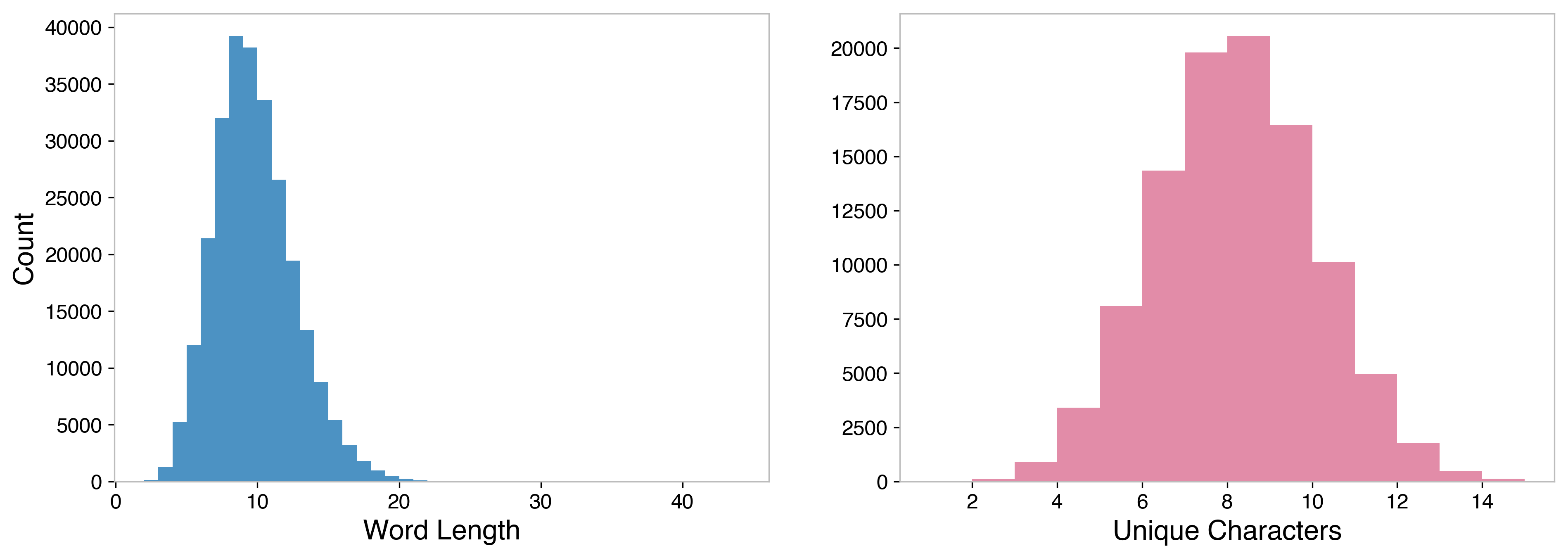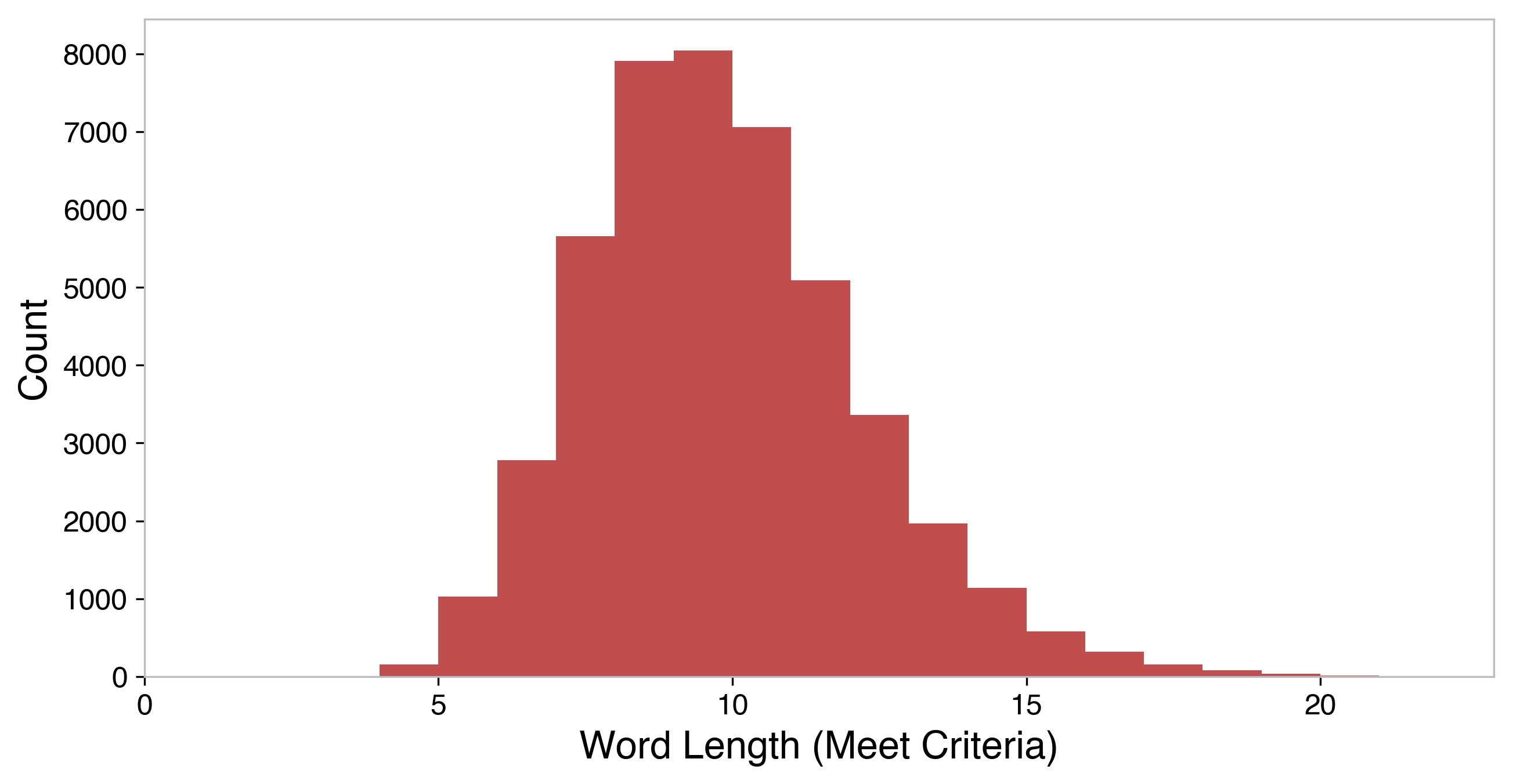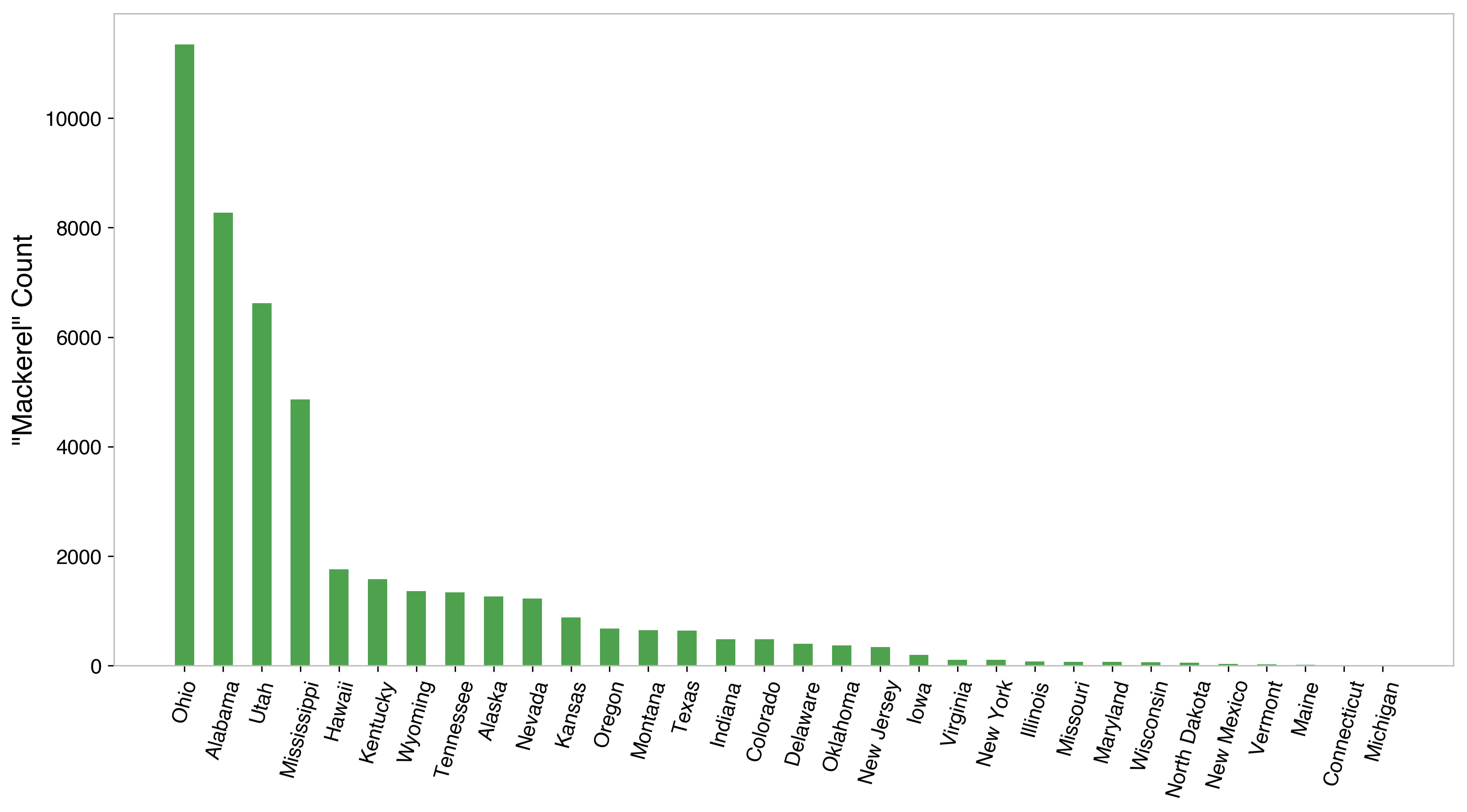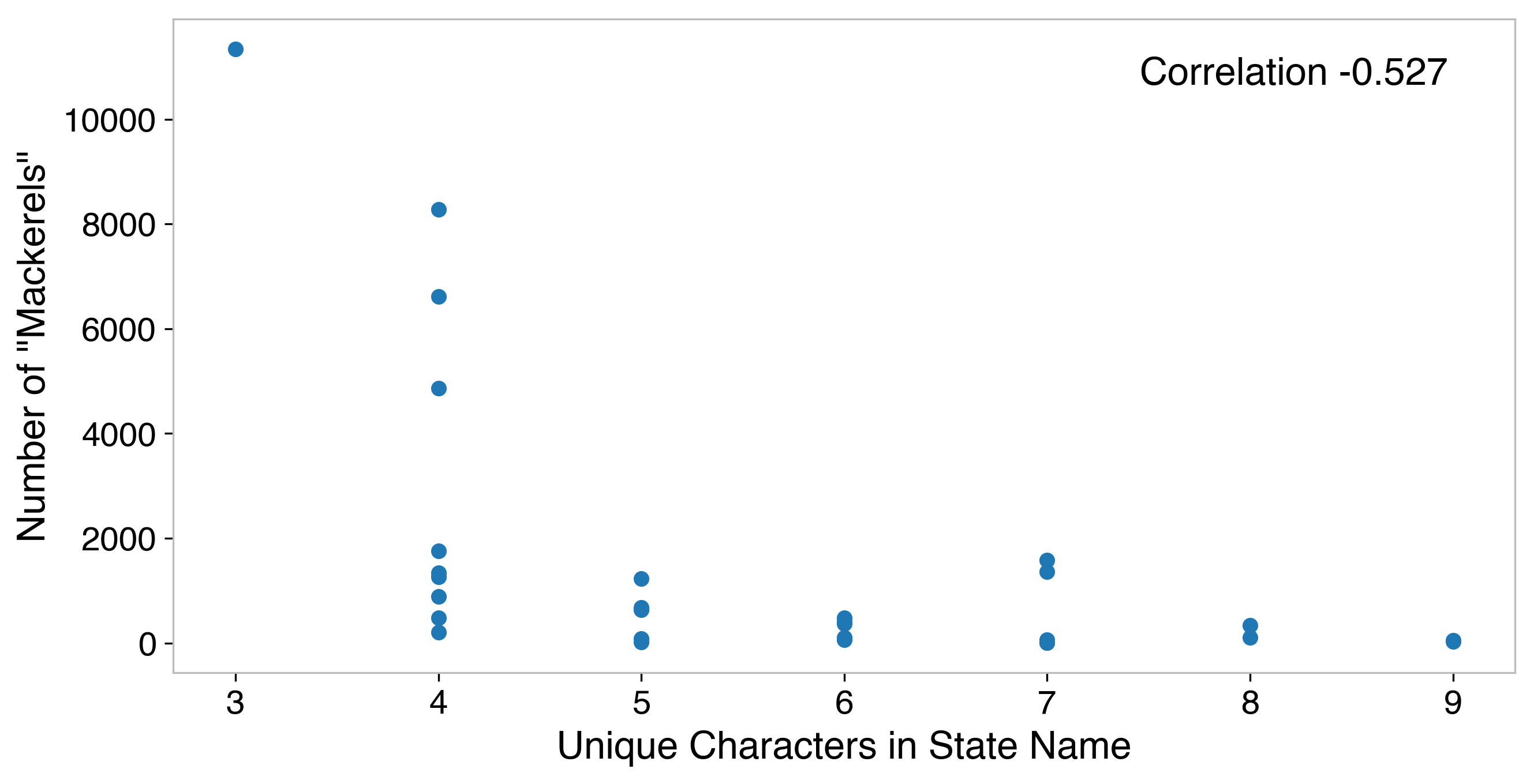2024 Rewind: Polynomial Regression in Bambi
Overview of polynomial regression using Bambi, through projectile motion and fictitious planets
Ohio is the only state whose name doesn’t share any letters with the word “mackerel.” It’s strange, but it’s true.
But that isn’t the only pairing of a state and a word you can say that about — it’s not even the only fish! Kentucky has “goldfish” to itself, Montana has “jellyfish” and Delaware has “monkfish,” just to name a few.
What is the longest “mackerel?” That is, what is the longest word that doesn’t share any letters with exactly one state? (If multiple “mackerels” are tied for being the longest, can you find them all?)
Extra credit: Which state has the most “mackerels?” That is, which state has the most words for which it is the only state without any letters in common with those words?
First things first, I downloaded the data linked in the original problem statement, Peter Norvig’s word list, and created a list of state names. Before diving into the solution, I took an exploratory look at the data, looking at word lengths. There are 263,533 words in total, with the mean word length being 9.3, median of 9, and standard deviation of 2.9. The longest word included in the dataset is “pneumonoultramicroscopicsilicovolcanoconiosis,” which according to dictionary.com, is
An obscure term ostensibly referring to a lung disease caused by silica dust, sometimes cited as one of the longest words in the English language.
In essence, that’s not really the question we’re worried about. For the comparison we’re making, we’re interested in the number of unique characters in each word. Those figures are lower than the total dataset - the mean is 7.71, median is 8, and standard deviation is 1.9. Further, this reduces the problem to 101,137 unique character sets, from the original 263,533.

The word with the most unique characters is “phenylthiocarbamides,” which uses an impressive 20 out of the 26 letters in the alphabet. According to wikipedia, this is:
Phenylthiocarbamide (PTC), also known as phenylthiourea (PTU), is an organosulfur thiourea containing a phenyl ring.
It has the unusual property that it either tastes very bitter or is virtually tasteless, depending on the genetic makeup of the taster.
Next, I went ahead and tackled the problem at hand. I wrote a function in python that compared each word against each state. If the word doesn’t share characters with one and only one state, the function returns that state, otherwise it returns a None, which is used in a simple logic flow to solve the subsequent problems. To manage computation time, I tried to escape this function as quickly as possible - as soon as it doesn’t share words with two states, it isn’t a “mackerel” candidate so None is returned indicating that it’s failed.
For the first part of the problem, I need to find the length of the longest word that meets the “mackerel” criteria. I start at the longest word, and work my way to shorter words until the criteria is met. The function stopped at “Hydrochlorofluorocarbon,” which shares no letters with just the state of Mississippi. Since that is length 23, I then rerun the function for all words of that length to check for any ties, which there was one, so the solution to the problem is:
Counterproductivenesses which doesn’t share letters with Alabama
Hydrochlorofluorocarbon which doesn’t share letters with Mississippi
From there, I removed the stopping condition once a match was found, and reran for the full dataset (computationally, this problem was manageable; this ran quickly). I found 45,385 words that met the criteria of sharing letters with all but one state. These words match the total population well, the mean word length is similar at 9.37.

Next, I look at the extra credit portion of the question - which state has the most words which don’t share letters with only it. The way I set up the function to check if a word was a “mackerel,” it returned the name of the state which it shared no letters with; this return was designed to solve this part of the problem. I summed the counts for each state and found the following results:

This gives us the solution that:
One note here is that four states with the most “Mackerels” are Ohio (11,342), Alabama (8,274), Utah (6,619), and Mississippi (4,863). These are notable because they have 3, 4, 4, and 4 unique letters in them, respectively. This gets back to something I mentioned earlier: the real question here is how many unique characters are in each. So I took a look at the correlation between number of “mackerels,” the words that don’t share letters with only that state, and the number of unique characters in the state name.

As expected, these exhibit a negative correlation, to the tune of -0.53, meaning the more unique characters a state has, the fewer of these words we expect. The states with the fewest number of “mackerels” both have 7 unique characters, Connecticut (9 “mackerels”) and Michigan (7 “mackerels”). The states with the most unique characters are North Dakota and New Mexico, each with 9 unique characters. As expected, both of these are in the bottom 6 in terms of number of “mackerels,” with 54 and 30 respectively.
See the code for this project on my GitHub!
Overview of polynomial regression using Bambi, through projectile motion and fictitious planets
A terminal user interface for Linear project management
A lightning-round collection of loose threads from 2025
Books I read in 2023
Who will win this year’s cup?
Books I read in 2022
Just how lucky have the 18-3 Bruins gotten?
Interoperability is the name of the game
Books I read in 2021
I got a job!
Books I read in 2020
Revisiting some old work, and handling some heteroscadasticity
Using a Bayesian GLM in order to see if a lack of fans translates to a lack of home-field advantage
An analytical solution plus some plots in R (yes, you read that right, R)
okay… I made a small mistake
Creating a practical application for the hit classifier (along with some reflections on the model development)
Diving into resampling to sort out a very imbalanced class problem
Or, ‘how I learned the word pneumonoultramicroscopicsilicovolcanoconiosis’
Amping up the hit outcome model with feature engineering and hyperparameter optimization
Can we classify the outcome of a baseball hit based on the hit kinematics?
Updates on my PhD dissertation progress and defense
My bread baking adventures and favorite recipes
A summary of my experience applying to work in MLB Front Offices over the 2019-2020 offseason
Books I read in 2019
Busting out the trusty random number generator
Perhaps we’re being a bit hyperbolic
Revisiting more fake-baseball for 538
A deep-dive into Lance Lynn’s recent dominance
Fresh-off-the-press Higgs results!
How do theoretical players stack up against Joe Dimaggio?
I went to Pittsburgh to talk Higgs
If baseball isn’t random enough, let’s make it into a dice game
Random one-off visualizations from 2019
Books I read in 2018
Or: how to summarize a PhD’s worth of work in 8 minutes
Double the Higgs, double the fun!
A data-driven summary of the 2018 Reddit /r/Baseball Trade Deadline Game
A 2017 player analysis of Tommy Pham